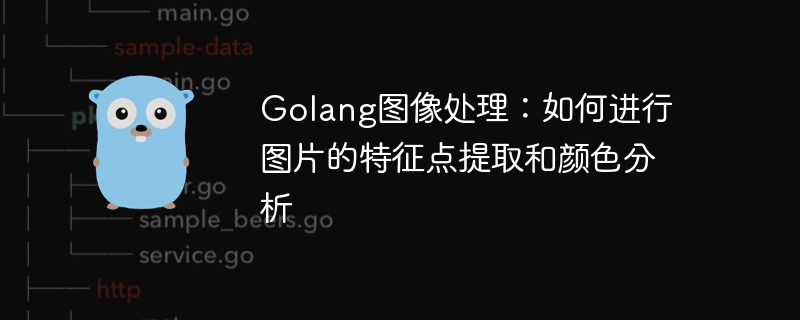

Golang image processing: How to extract feature points and color analysis of images
With the development of the Internet and mobile devices, image processing Technology plays an increasingly important role in various fields. In image processing, feature point extraction and color analysis are two very common and critical tasks. This article will introduce how to use Golang to extract feature points and color analysis of images, and provide corresponding code examples.
Image feature point extraction refers to finding the key points representing the local features of the object from the image. These key points can be used for image matching, image recognition, target tracking and other applications. In Golang, we can use the github.com/anthonynsimon/bild/feature/brisk package to extract feature points of images. Here is a simple example:
package main
import (
"image"
"image/color"
"log"
"os"
"github.com/anthonynsimon/bild/feature/brisk"
"github.com/anthonynsimon/bild/imgio"
"github.com/anthonynsimon/bild/transform"
)
func main() {
// 打开图像文件
imageFile, err := os.Open("input.jpg")
if err != nil {
log.Fatal(err)
}
defer imageFile.Close()
// 解码图像
inputImage, _, err := image.Decode(imageFile)
if err != nil {
log.Fatal(err)
}
// 缩放图像以提高速度和准确性
scaledImage := transform.Resize(inputImage, 300, 0, transform.Linear)
// 提取特征点
features := brisk.Detect(scaledImage, nil)
// 在图像上绘制特征点
outputImage := imgio.CloneImage(inputImage)
drawFeatures(outputImage, features)
// 保存结果图像
outputFile, err := os.Create("output.jpg")
if err != nil {
log.Fatal(err)
}
defer outputFile.Close()
// 编码并保存图像
err = imgio.JPEGEncoder(100).Encode(outputFile, outputImage)
if err != nil {
log.Fatal(err)
}
}
// 在图像上绘制特征点
func drawFeatures(img draw.Image, features []brisk.Feature) {
drawer := draw.Draw(img, img.Bounds(), img, image.ZP, draw.Src)
for _, feature := range features {
drawer.DrawRect(feature.Rectangle, color.RGBA{255, 0, 0, 255})
}
} In this example, we first open the image file using the Open function and decode the image using the Decode function. Then, we use the Resize function to scale the image, which can improve the speed and accuracy of feature point extraction. Next, we use the Detect function to extract feature points, and use the DrawRect function to draw the feature points on the original image. Finally, we encode and save the resulting image in JPEG format using the Encode function.
Image color analysis refers to the statistics and analysis of different colors appearing in images. Color information is very important in image processing and can be used for tasks such as image classification and object recognition. In Golang, we can use the github.com/anthonynsimon/bild/analysis package to perform color analysis. Here is a simple example:
package main
import (
"image"
"log"
"os"
"github.com/anthonynsimon/bild/analysis"
"github.com/anthonynsimon/bild/imgio"
)
func main() {
// 打开图像文件
imageFile, err := os.Open("input.jpg")
if err != nil {
log.Fatal(err)
}
defer imageFile.Close()
// 解码图像
inputImage, _, err := image.Decode(imageFile)
if err != nil {
log.Fatal(err)
}
// 进行颜色分析
colors := analysis.ExtractColors(inputImage, 10)
// 打印结果
for _, color := range colors {
log.Printf("Color: %v, Frequency: %v", color.Color, color.Frequency)
}
} In this example, we first open the image file using the Open function and decode the image using the Decode function. We then use the ExtractColors function to perform color analysis on the image and specify the number of colors to extract. Finally, we use the log.Printf function to print the results.
This article introduces how to use Golang to extract feature points and color analysis of images, and provides corresponding code examples. By learning and using these techniques, we can better understand and process image data and achieve better results in various fields of image processing. I hope this article can be helpful to readers in their study and practice of image processing.
The above is the detailed content of Golang image processing: How to extract feature points and color analysis of images. For more information, please follow other related articles on the PHP Chinese website!




